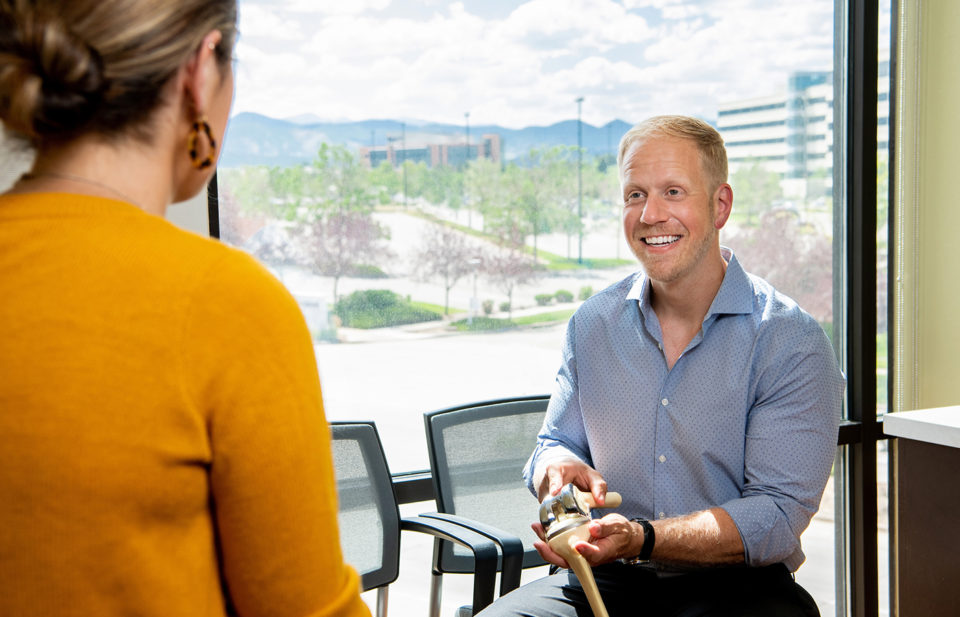
Is Outpatient Total Joint Surgery Right for Me?
Dr. Jesse Chrastil, MD, discusses the benefits of outpatient total joint and who would likely be a good candidate.
What is outpatient total joint surgery?
Outpatient total joint surgery is when a patient undergoes total joint replacement surgery (i.e. a knee or hip replacement) and goes home the same day. Historically, these surgeries have only been performed as an inpatient surgery. The older procedures took longer to perform and were larger more invasive procedures. Insurance companies used to require an inpatient stay. Now, with improved implants, better techniques, and multimodal medication regimens, insurance companies and the public are starting to recognize and accept outpatient surgery is equally if not more effective with many advantages.
What are the benefits of outpatient surgery compared to a traditional total joint surgery?
The surgeries themselves are similar. The difference is that outpatient total joint surgery often uses improved, more minimally invasive techniques, which leads to a shorter recovery time. Historically, patients could spend two weeks to recover in the hospital. Now, with these medical advancements, patients often have less pain, greater initial function, and are safe to go home the same day as surgery.
Do I get better care in the hospital or at home?
While the care in a hospital can be amazing and the facilities I work at have outstanding nursing staff and therapists, as long as you have a good support system at home, recent research articles show that patients who go home have higher satisfaction and return slightly quicker to activities of daily living than those who stayed in the hospital. This may happen because when patients go home the same day as their surgery they start returning to those activities at an earlier time.
What if I’m not comfortable going home the same day?
Even if you were initially approved for an outpatient surgery, you would stay overnight if there were any concerns. This could include if there were any medical concerns or if you did not feel confident or comfortable with same day discharge.
Is outpatient surgery safe?
Outpatient surgery is safe. Current day joint replacement is much safer than joint replacements historically. Operative times, anesthesia techniques, the risk of blood transfusion, and medical technology have all improved. Surgeons who perform outpatient total joint replacements are often highly specialized in minimally invasive techniques and have done hundreds if not thousands of joint replacement surgeries. This proficiency can lead to lower pain levels and faster recovery times for patients.
Who is a good candidate for outpatient total joint surgery?
Common guidelines to be a good candidate for outpatient total joint surgery include:
- Patient is overall health with no substantial cardiac disease or cerebral vascular disease.
- No diabetes or controlled diabetes.
- Health weight profile (BMI < 35).
- Good home support system.
- Under the age of 80.
- Be well educated in joint surgery after-care and confident on how to take care of themselves after discharge.
Does it cost more than traditional surgery?
Outpatient surgery is substantially more cost effective to the health care system as a whole. When a patient stays overnight, it requires additional care from nurses, labs, and other inpatient expenses. Outpatient surgery can help drive down healthcare costs, which in turn drives down premiums.
What do I do when I get home?
Once you get home, settle in and get comfortable for your recovery. Plan to spend the day primarily downstairs in a recliner and stay on schedule with your medications. If your bedroom is upstairs, do not worry. Before you leave the hospital, a physical therapist will show you how to walk and move up and down the stair safely. The therapist will also show you some easy exercises to do at home. Besides your prescribed exercises you should plan on taking it a little easy the first 24-72 hours. I do recommend early ambulation and mobilization, meaning I want my patients getting up hourly to move and keep the knee/hip limber and the blood moving through all extremities – but nothing overly strenuous.
What kind of medications do I take at home?
The pain medications you will take at home are the same medications you would receive at the hospital. Before you leave the hospital the nurse will teach you about your medications including the proper dose and timing. The key is to make a schedule and stay on top of the pain.
About Dr. Jesse Chrastil
Jesse Chrastil, MD is a board-certified orthopedic surgeon specializing in hip and knee arthritis. His practice focuses on hip and knee replacement surgery and he takes a minimally invasive approach and performs anterior hip replacements. He also has extensive experience with outpatient surgery where eligible patients are able to receive their hip or knee replacement surgery and return home the same day.
Dr. Chrastil grew up in rural Nebraska where he obtained his undergraduate degree from the University of Nebraska at Lincoln. He attended medical school at the University of Nebraska Medical Center and pursued his career in orthopedic surgery with a residency at the University of Utah.
He takes a patient-centered approach to medicine, taking time to educate patients and their families about operative and non-operative approaches to arthritic hips and knees. Additionally, Dr. Chrastil brings Midwest values and honest answers to the often complex experience of medicine and surgery.
Want to know more? Find Dr. Chrastil on YouTube, Facebook, and Instagram.
